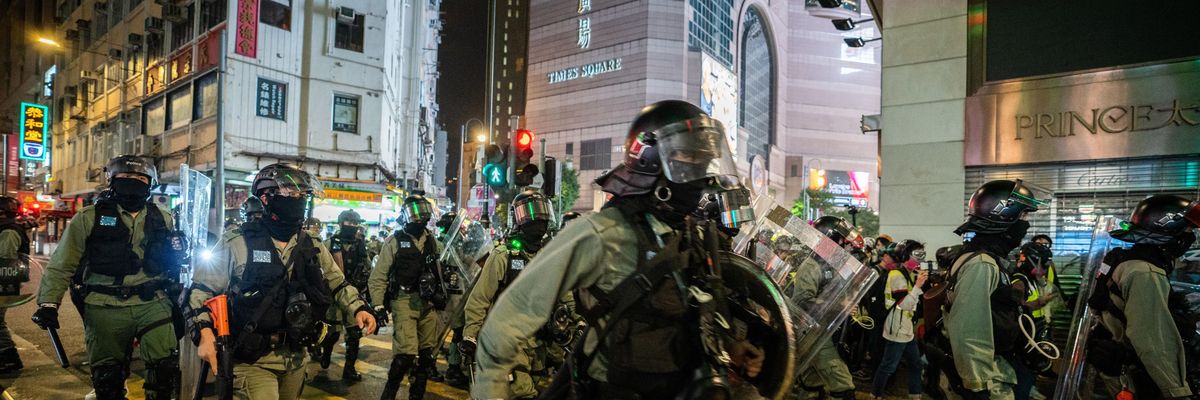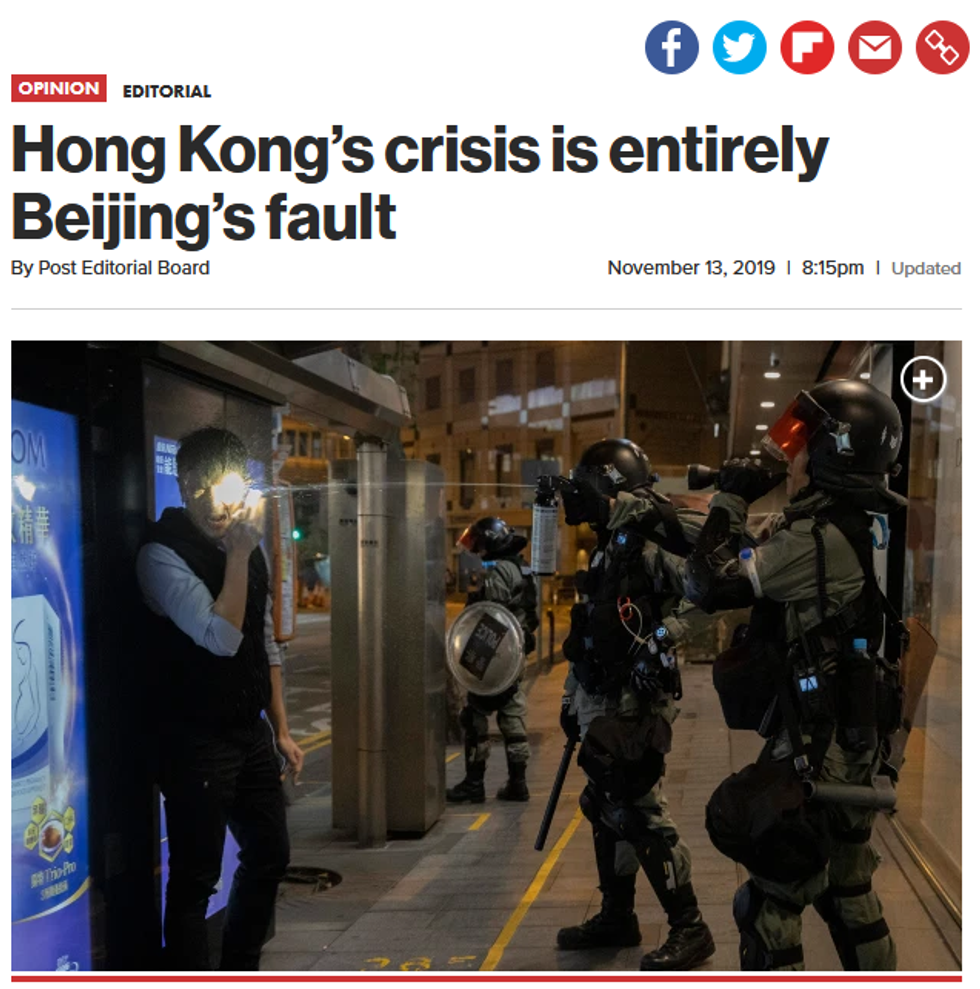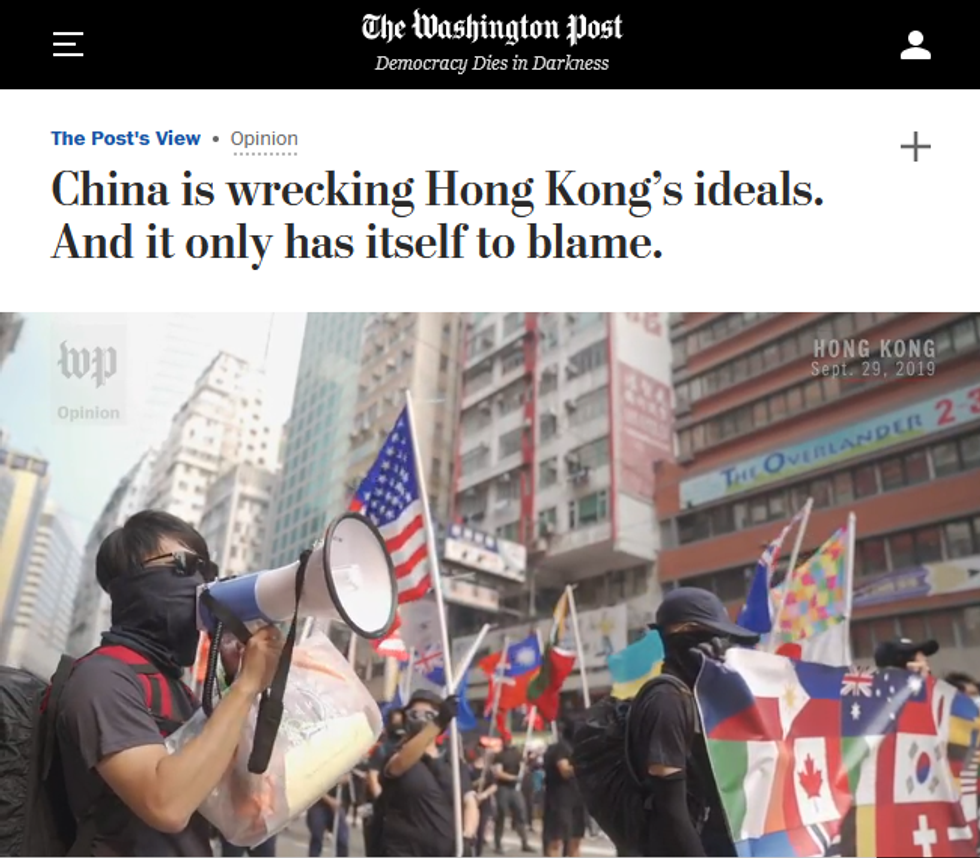

SUBSCRIBE TO OUR FREE NEWSLETTER
Daily news & progressive opinion—funded by the people, not the corporations—delivered straight to your inbox.
5
#000000
#FFFFFF
To donate by check, phone, or other method, see our More Ways to Give page.


Daily news & progressive opinion—funded by the people, not the corporations—delivered straight to your inbox.

HONG KONG, CHINA - 2020/01/01: Riot police officers in formation rushing to arrest protesters during the new year day demonstration. The unrest in Hong Kong shows no sign of a abating in 2020, with the new year marked by rallies showing continued resistance against Beijing's tightening grip over the financial hub. (Photo: Geovien So/SOPA Images/LightRocket via Getty Images)
The New York Police Department (NYPD) can generally rely on corporate media as allies on controversial police issues. A case in point was the New York subway protests earlier this month, in which the activist group Decolonize This Place organized hundreds of people to occupy New York City subway stations to demand free transit for all and an end to racialized overpolicing on the subway system. There was one injury reported.
The prospect of an event overtly critical of police tactics had Fox News (1/31/20) scandalized. "Antifa Plans Massive Anti-Cop Action in NY Subways," its headline read. Quoting the Police Benevolent Association, it claimed that the "anti-police movement" is aiming for the "destruction of public order." Like Fox, Britain's Daily Mail (2/1/20) appeared particularly appalled that demonstrators were covering their faces: "Masked Anti-Cop Protesters Storm Grand Central During Rush Hour and Vandalize Subway Stations Across New York," ran its headline.
Local news like ABC7 New York (2/5/20) claimed that the masked "vandals" were part of a "criminal effort" that had "trashed" the subway. Examples of subway destruction offered amounted to squirting glue into card readers and locking a door open, allowing commuters to ride for free. Reporter Derick Waller also told viewers that protesters painted vulgar messages, the camera panning to a wall reading "No NYPD" to illustrate. ABC ended with an appeal to arrest protesters: "Anyone with information is urged to call the NYPD's Crime Stoppers Hotline."
This was hardly Shay's Rebellion. Yet the New York Daily News (2/4/20) was still outraged: "Trashing The Subway, Is a Crime, Not Political Speech," it argued, as it called for state retribution.
But it was perhaps the New York Post--noted for repeating NYPD talking points (FAIR.org, 7/26/19)--that was the most dead set against the action. "Cop-hating vandals" and "radical agitators" "stormed Grand Central Terminal during rush hour," "wreaking havoc" and holding "hateful signs" like "No Fare No Cops," it told readers (1/31/20, 2/5/20). The cop-haters, according to one source (2/1/20), were carrying out a "twisted agenda" of "violence against police." Throughout its reporting, the only sources were anonymous police officials, leading the stories to sound very much like they were written by the NYPD themselves.
This love of police is not extended to Hong Kong officers, however. In comparison to New York City, where the extent of the damage was limited to what small amounts of paint and glue could do, in October, Hong Kong demonstrators shut down the entire subway system (that carries 5 million daily) by bombing trains and stations. While reporting on the bombing, the New York Post (10/12/19) insisted that they were not anti-cop vandals, but peaceful "pro-democracy protesters" defending the autonomy of the city state against Beijing. An earlier subway clash was described (New York Post, 8/12/19) as police launching a "violent crackdown on pro-democracy demonstrators."

Another Post editorial (11/13/20) made it absolutely clear who they thought was responsible: "Hong Kong's Crisis Is Entirely Beijing's Fault" was its headline, as the editorial board condemned the "relentless drive to remove all [the pro-democracy protesters'] liberties."
Corporate media that appeared so alarmed with New Yorkers wearing masks glorified their counterparts in Hong Kong doing the same thing. The first sentence of CNBC's report (10/4/19) on the government's mask ban and the subsequent subway shutdown included the remarkable phrase, "pro-democracy protesters torched businesses and metro stations," a combination of terms--"pro-democracy" and "torched"--not likely to be seen had US leftists done the same thing. While emphasizing that in response to the mask ban, protesters "hurled petrol bombs at police," the report maintained that they were part of a "pro-democracy movement."

Reuters (10/5/19) and the BBC (10/4/19) also described thousands of masked activists shutting down the entire subway network, by bombing stations and setting fire to trains, as part of a "pro-democracy" protest. The Washington Post's editorial (10/5/19) on the subject presented the masked activists as champions of the "rule of law," protesting against "police brutality" and "excessive use of force," and trying to "preserve their free market and political liberties." China is solely at fault, it concluded.
The message from the media is clear: Their protesters are good, regardless of what they do; ours are vandals, thugs or criminals. Their cops are bad; ours are unimpeachable heroes under fire for just doing their jobs. Journalists that work closely with police, credulously repeating their statements and printing copaganda, pushing a dubious "war on cops" narrative echoed by Trump himself, can effortlessly turn into anarcho-communists challenging authority, depending on the nation being reported on.
Dear Common Dreams reader, The U.S. is on a fast track to authoritarianism like nothing I've ever seen. Meanwhile, corporate news outlets are utterly capitulating to Trump, twisting their coverage to avoid drawing his ire while lining up to stuff cash in his pockets. That's why I believe that Common Dreams is doing the best and most consequential reporting that we've ever done. Our small but mighty team is a progressive reporting powerhouse, covering the news every day that the corporate media never will. Our mission has always been simple: To inform. To inspire. And to ignite change for the common good. Now here's the key piece that I want all our readers to understand: None of this would be possible without your financial support. That's not just some fundraising cliche. It's the absolute and literal truth. We don't accept corporate advertising and never will. We don't have a paywall because we don't think people should be blocked from critical news based on their ability to pay. Everything we do is funded by the donations of readers like you. Will you donate now to help power the nonprofit, independent reporting of Common Dreams? Thank you for being a vital member of our community. Together, we can keep independent journalism alive when it’s needed most. - Craig Brown, Co-founder |
The New York Police Department (NYPD) can generally rely on corporate media as allies on controversial police issues. A case in point was the New York subway protests earlier this month, in which the activist group Decolonize This Place organized hundreds of people to occupy New York City subway stations to demand free transit for all and an end to racialized overpolicing on the subway system. There was one injury reported.
The prospect of an event overtly critical of police tactics had Fox News (1/31/20) scandalized. "Antifa Plans Massive Anti-Cop Action in NY Subways," its headline read. Quoting the Police Benevolent Association, it claimed that the "anti-police movement" is aiming for the "destruction of public order." Like Fox, Britain's Daily Mail (2/1/20) appeared particularly appalled that demonstrators were covering their faces: "Masked Anti-Cop Protesters Storm Grand Central During Rush Hour and Vandalize Subway Stations Across New York," ran its headline.
Local news like ABC7 New York (2/5/20) claimed that the masked "vandals" were part of a "criminal effort" that had "trashed" the subway. Examples of subway destruction offered amounted to squirting glue into card readers and locking a door open, allowing commuters to ride for free. Reporter Derick Waller also told viewers that protesters painted vulgar messages, the camera panning to a wall reading "No NYPD" to illustrate. ABC ended with an appeal to arrest protesters: "Anyone with information is urged to call the NYPD's Crime Stoppers Hotline."
This was hardly Shay's Rebellion. Yet the New York Daily News (2/4/20) was still outraged: "Trashing The Subway, Is a Crime, Not Political Speech," it argued, as it called for state retribution.
But it was perhaps the New York Post--noted for repeating NYPD talking points (FAIR.org, 7/26/19)--that was the most dead set against the action. "Cop-hating vandals" and "radical agitators" "stormed Grand Central Terminal during rush hour," "wreaking havoc" and holding "hateful signs" like "No Fare No Cops," it told readers (1/31/20, 2/5/20). The cop-haters, according to one source (2/1/20), were carrying out a "twisted agenda" of "violence against police." Throughout its reporting, the only sources were anonymous police officials, leading the stories to sound very much like they were written by the NYPD themselves.
This love of police is not extended to Hong Kong officers, however. In comparison to New York City, where the extent of the damage was limited to what small amounts of paint and glue could do, in October, Hong Kong demonstrators shut down the entire subway system (that carries 5 million daily) by bombing trains and stations. While reporting on the bombing, the New York Post (10/12/19) insisted that they were not anti-cop vandals, but peaceful "pro-democracy protesters" defending the autonomy of the city state against Beijing. An earlier subway clash was described (New York Post, 8/12/19) as police launching a "violent crackdown on pro-democracy demonstrators."

Another Post editorial (11/13/20) made it absolutely clear who they thought was responsible: "Hong Kong's Crisis Is Entirely Beijing's Fault" was its headline, as the editorial board condemned the "relentless drive to remove all [the pro-democracy protesters'] liberties."
Corporate media that appeared so alarmed with New Yorkers wearing masks glorified their counterparts in Hong Kong doing the same thing. The first sentence of CNBC's report (10/4/19) on the government's mask ban and the subsequent subway shutdown included the remarkable phrase, "pro-democracy protesters torched businesses and metro stations," a combination of terms--"pro-democracy" and "torched"--not likely to be seen had US leftists done the same thing. While emphasizing that in response to the mask ban, protesters "hurled petrol bombs at police," the report maintained that they were part of a "pro-democracy movement."

Reuters (10/5/19) and the BBC (10/4/19) also described thousands of masked activists shutting down the entire subway network, by bombing stations and setting fire to trains, as part of a "pro-democracy" protest. The Washington Post's editorial (10/5/19) on the subject presented the masked activists as champions of the "rule of law," protesting against "police brutality" and "excessive use of force," and trying to "preserve their free market and political liberties." China is solely at fault, it concluded.
The message from the media is clear: Their protesters are good, regardless of what they do; ours are vandals, thugs or criminals. Their cops are bad; ours are unimpeachable heroes under fire for just doing their jobs. Journalists that work closely with police, credulously repeating their statements and printing copaganda, pushing a dubious "war on cops" narrative echoed by Trump himself, can effortlessly turn into anarcho-communists challenging authority, depending on the nation being reported on.
The New York Police Department (NYPD) can generally rely on corporate media as allies on controversial police issues. A case in point was the New York subway protests earlier this month, in which the activist group Decolonize This Place organized hundreds of people to occupy New York City subway stations to demand free transit for all and an end to racialized overpolicing on the subway system. There was one injury reported.
The prospect of an event overtly critical of police tactics had Fox News (1/31/20) scandalized. "Antifa Plans Massive Anti-Cop Action in NY Subways," its headline read. Quoting the Police Benevolent Association, it claimed that the "anti-police movement" is aiming for the "destruction of public order." Like Fox, Britain's Daily Mail (2/1/20) appeared particularly appalled that demonstrators were covering their faces: "Masked Anti-Cop Protesters Storm Grand Central During Rush Hour and Vandalize Subway Stations Across New York," ran its headline.
Local news like ABC7 New York (2/5/20) claimed that the masked "vandals" were part of a "criminal effort" that had "trashed" the subway. Examples of subway destruction offered amounted to squirting glue into card readers and locking a door open, allowing commuters to ride for free. Reporter Derick Waller also told viewers that protesters painted vulgar messages, the camera panning to a wall reading "No NYPD" to illustrate. ABC ended with an appeal to arrest protesters: "Anyone with information is urged to call the NYPD's Crime Stoppers Hotline."
This was hardly Shay's Rebellion. Yet the New York Daily News (2/4/20) was still outraged: "Trashing The Subway, Is a Crime, Not Political Speech," it argued, as it called for state retribution.
But it was perhaps the New York Post--noted for repeating NYPD talking points (FAIR.org, 7/26/19)--that was the most dead set against the action. "Cop-hating vandals" and "radical agitators" "stormed Grand Central Terminal during rush hour," "wreaking havoc" and holding "hateful signs" like "No Fare No Cops," it told readers (1/31/20, 2/5/20). The cop-haters, according to one source (2/1/20), were carrying out a "twisted agenda" of "violence against police." Throughout its reporting, the only sources were anonymous police officials, leading the stories to sound very much like they were written by the NYPD themselves.
This love of police is not extended to Hong Kong officers, however. In comparison to New York City, where the extent of the damage was limited to what small amounts of paint and glue could do, in October, Hong Kong demonstrators shut down the entire subway system (that carries 5 million daily) by bombing trains and stations. While reporting on the bombing, the New York Post (10/12/19) insisted that they were not anti-cop vandals, but peaceful "pro-democracy protesters" defending the autonomy of the city state against Beijing. An earlier subway clash was described (New York Post, 8/12/19) as police launching a "violent crackdown on pro-democracy demonstrators."

Another Post editorial (11/13/20) made it absolutely clear who they thought was responsible: "Hong Kong's Crisis Is Entirely Beijing's Fault" was its headline, as the editorial board condemned the "relentless drive to remove all [the pro-democracy protesters'] liberties."
Corporate media that appeared so alarmed with New Yorkers wearing masks glorified their counterparts in Hong Kong doing the same thing. The first sentence of CNBC's report (10/4/19) on the government's mask ban and the subsequent subway shutdown included the remarkable phrase, "pro-democracy protesters torched businesses and metro stations," a combination of terms--"pro-democracy" and "torched"--not likely to be seen had US leftists done the same thing. While emphasizing that in response to the mask ban, protesters "hurled petrol bombs at police," the report maintained that they were part of a "pro-democracy movement."

Reuters (10/5/19) and the BBC (10/4/19) also described thousands of masked activists shutting down the entire subway network, by bombing stations and setting fire to trains, as part of a "pro-democracy" protest. The Washington Post's editorial (10/5/19) on the subject presented the masked activists as champions of the "rule of law," protesting against "police brutality" and "excessive use of force," and trying to "preserve their free market and political liberties." China is solely at fault, it concluded.
The message from the media is clear: Their protesters are good, regardless of what they do; ours are vandals, thugs or criminals. Their cops are bad; ours are unimpeachable heroes under fire for just doing their jobs. Journalists that work closely with police, credulously repeating their statements and printing copaganda, pushing a dubious "war on cops" narrative echoed by Trump himself, can effortlessly turn into anarcho-communists challenging authority, depending on the nation being reported on.